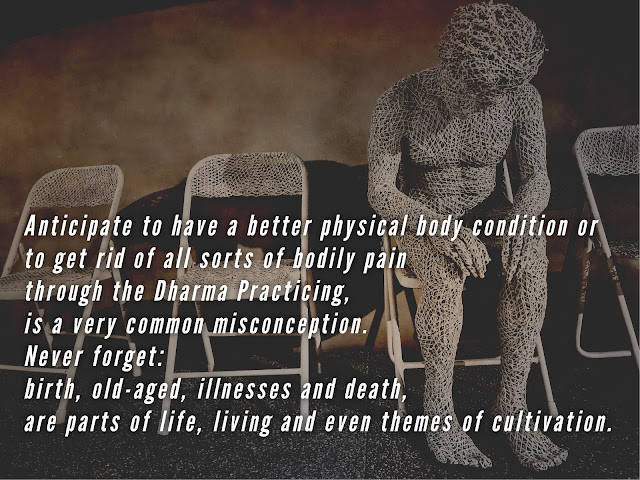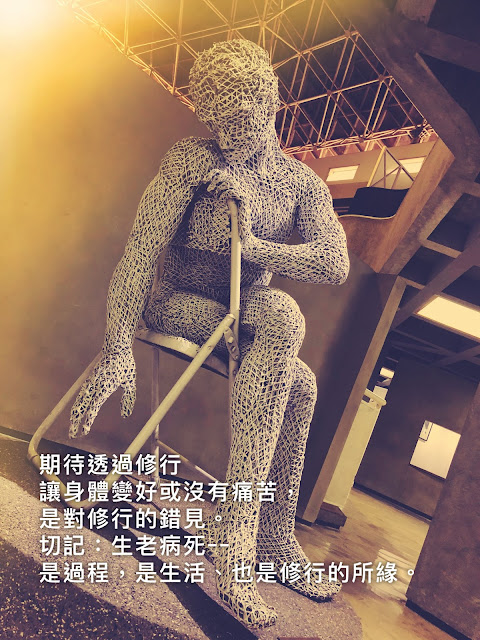Q&A (2021/10/24)
VERSE 142
Because Lady Vaidehī experienced the suffering of this world deeply, she did not want to be reborn in this world, so the Buddha told her about the Most Blissful Pure Land. ……
1. Who is Lady Vaidehī? Is she associated with a sutta?
~> Pāli Vedehī. The wife of King Bimbisāra 頻婆沙羅 of Magadha, and the mother of Ajātaśatru 阿闍世. When the king was imprisoned, she asked the Śākyamuni to preach, and he responded by delivering the sermon of the *Guan wuliangshou jing 觀無量壽經. Throughout the sutra, Vaidehī and Ānanda serve as the main recipients of the sermon, which consists of a series of instructions on how to contemplate in a way that will bring rebirth into the Pure Land. At the end of the sutra, she receives assurance from the Buddha that she will be reborn in the Pure Land. She also appears in the Lotus Sutra. Her name is translated as 思惟, 思勝, 勝妙身, etc. (quoted from http://www.buddhism-dict.net/ddb/)
*Guan wuliangshou jing 觀無量壽經 : Sutra of the Meditation on the Buddha of Immeasurable Life
The Medicine Buddha's Pure Land is in the east, which symbolizes growth, whereas Amitâbha Buddha's Pure Land is in the west, which symbolizes retirement. ……
2. As mentioned in the Mandala:
a) In regards to Abitaba: Does retirement mean death?
~> The word “retirement” is actually translated from 歸藏,歸(gui) literally means return, back to the where we belong (back to pure land); 藏(zang) literally means a place that full of treasure (the treasure of merits and happiness).
b) Is there an East Medicine West Amitâbha Yin Yang connection here?
~> YIN陰YANG陽, is two forces of creativity from classical Chinese philosophy, and first defined extensively in the Yijing [易經]. However, in Buddhism does not explicitly mention the concept of yin and yang.
~> We have countless of Buddhas in all directions, and emphasizing East and West here in Mahāyāna Buddhism, is mainly to conform to the two general tendencies of the people: some people focus on this life, while others focus on the afterlife.
Medicine Buddha made twelve great vows with great compassion. His aim was to develop knowledge, to promote enterprises, to save and heal those with bodily defects, poverty, illness, and helplessness, to enable people to enjoy abundant clothing and food, to keep people from believing in deviant teachers and non-Buddhists……
3. Why is the word enterprising used? And the word abundant?
~> “To Promote Enterprise” may not be a precise translation, it is actually meant: to boost the economy, develop opportunities, make society thrive, and people can live and work in peace and contentment. And this is one of the vow from Medicine Buddha.
~> Food, clothing, sheltering and medicine can be said to be everyone's basic needs in life.
~> We can learn from the news that the living conditions of the people in some countries are extremely terrible due to the lack of basic living materials. Not only are there many diseases, but people also ignore moral values because of poverty, and commit crimes frequently, resulting in social chaos and uneasiness. Hence, “ABUNDANCE” is also a vow of Medicine Buddha, and the Medicine Buddha wishes that all beings will live in a world of abundance.
So Yu Lin was full of praise: "In the world there are cranes that can carry one to Yangzhou; there is also the boat of the Tathagata' s virtue that can ferry one to the other shore."
4. What is the Tathagata's virtue and how does it work?
~> It is actually referring to what we have studied right now, all the pāramitās.
~> The virtues of the Tathagata are actually achieved through learning the way of the Buddhahood.
~> The six paramitas are the good causes, and they are called the virtue of the Buddha when they are fully accomplished.
~> When a bodhisattva has attained the virtue of the Buddha, it is like moving away from THIS SHORE which is full of troubles and fears to the OTHER SHORE which is free from all kinds of suffering and defilement.
VERSE 143
Some people casually practice this or that, without determination and perseverance, and eventually develop bad habits and accomplish nothing.
5. “Since people practice this or that casually”...…What would be an example of this? Does it mean practicing without the goal of enlightenment?
~> Some practitioners like to listen to the Dharma everywhere, but never practice it. I think it is a common example.
~> This is to urge every practitioner, “Once one has started to practice, one should proceed from the beginning to the end without giving up. Only in this way can one develop firm will power.”
~> I would like to suggest that the “purpose of practice” is more important than the “goal”.




